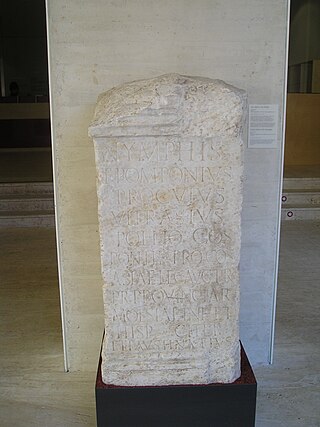Related Research Articles
Quintus Servilius Pudens was a Roman senator active during the second century AD. He was ordinary consul for the year 166 with Lucius Fufidius Pollio as his colleague, and he was proconsular governor of Africa around 180. Pudens is known only through surviving inscriptions.

Titus Pomponius Proculus Vitrasius Pollio was a Roman senator, who held several imperial appointments during the reign of Marcus Aurelius. He was suffect consul in an undetermined nundinium around 151; he was a consul ordinarius in the year 176 with Marcus Flavius Aper as his colleague.
Servius Cornelius Scipio Salvidienus Orfitus was the name of several Roman men who lived during the early Roman Empire. They were descendants of Orfitus who was adopted by Servius Cornelius Scipio, an otherwise unknown member of the patrician branch of the Cornelii Scipiones.
Gaius Bellicius Calpurnius Torquatus was a Roman senator during the reign of Antoninus Pius. He was consul posterior in 148 as the colleague of Lucius Octavius Cornelius Publius Salvius Julianus Aemilianus. Calpurnius Torquatus was the son of Gaius Bellicius Flaccus Torquatus Tebanianus, consul of 124, and the younger brother of Gaius Bellicius Flaccus Torquatus, consul of 143.
Lucius Dasumius Tullius Tuscus was a Roman senator who was an amici or trusted advisor of the emperors Antoninus Pius and Marcus Aurelius. He was suffect consul in the nundinium of April to June 152 AD as the colleague of Publius Sufenas.
Marcus Peducaeus Priscinus was a Roman senator of the second century. He was ordinary consul in the year 110 with Servius Cornelius Scipio Salvidienus Orfitus as his colleague. Priscinus is primarily known from inscriptions.
Marcus Peducaeus Stloga Priscinus was a Roman senator active during the middle of the second century AD. He was ordinary consul for 141 as the colleague of Titus Hoenius Severus. An inscription from the Great Theatre at Ephesus mentions a Marcus Peducaeus Priscinus as proconsular governor of Asia in 155/156, whom professor Géza Alföldy, amongst others, has identified as this Priscinus. Priscinus is known only through surviving inscriptions.
Lucius Venuleius Apronianus Octavius Priscus was a Roman senator active during the first half of the second century AD. He was suffect consul around the year 145, then ordinary consul in 168 with Lucius Sergius Paullus as his colleague. Priscus is known only from non-literary sources.
Marcus Pontius Laelianus Larcius Sabinus was a Roman senator and general who held a series of offices in the emperor's service. He was suffect consul for the nundinium of July-August 145 as the colleague of Quintus Mustius Priscus. Laelianus is primarily known through inscriptions.
Quintus Camurius Numisius Junior was a Roman senator active during the later second century AD. He was suffect consul for a nundinium in the first half of the year 161 as the colleague of Marcus Annius Libo.
Quintus Cornelius Quadratus was a Roman senator who held a number of offices in the emperor's service. He served as suffect consul for the nundinium July-September 147 as the colleague of Cupressenus Gallus. Quadratus is best known as the brother of the orator Marcus Cornelius Fronto. He is mentioned four times in the surviving correspondence of the orator.
Lucius Pullaienus Gargilius Antiquus was a Roman senator, who held a number of offices in the imperial service during the reign of Antoninus Pius. He is known to have been a suffect consul in the early years of the reign of Marcus Aurelius, most likely in the year 162. He is known entirely from inscriptions.
Titus Vitrasius Pollio was a Roman senator, who held a number of offices in the imperial service. He was suffect consul around the year 137.
Lucius Neratius Proculus was a Roman senator, who held several posts in the emperor's service. He was suffect consul in either the year 144 or 145. Proculus is known primarily from inscriptions.
The gens Salvidiena was a plebeian family at ancient Rome. Members of this gens are first mentioned toward the end of the Republic, and from then to the end of the second century they regularly filled the highest offices of the Roman state.
The gens Seia was a minor plebeian family of equestrian rank at ancient Rome. Members of this gens are first mentioned in the time of Cicero, and a few of them held various magistracies under the late Republic and into imperial times.
Quintus Cornelius Proculus was a Roman senator, who was active during the middle of the second century AD. He was suffect consul in the nundinium of November–December 146 as the colleague of Lucius Aemilius Longus. Proculus is known entirely from inscriptions.
Lucius Sergius Paullus was a Roman senator, who was active during the reign of Marcus Aurelius. He was twice consul: the first time attested 23 September of an unknown year as suffect consul with [? Lucius Nonius Calpurnius] Torquatus Asprenas as his colleague; and as consul ordinarius for 168 as the colleague of Lucius Venuleius Apronianus Octavius Priscus.
Quintus Egrilius Plarianus was a Roman senator, who was active during the reigns of Antoninus Pius and Marcus Aurelius. He was suffect consul for one of the nundinia in the first half of AD 144, as the colleague of Lucius Aemilius Carus. Plarianus was the son of Marcus Acilius Priscus Egrilius Plarianus; he also is known to have had a sister, Egrilia M.f. Plaria. Although his family had its origins in Ostia, it is likely he spent most of his life in Rome.
References
- ↑ Géza Alföldy, Konsulat und Senatorenstand unter den Antoninen (Bonn: Habelt Verlag, 1977), p. 176
- ↑ CIL XV, 1368, CIL XV, 1369, and CIL XV, 1370
- ↑ CIL V, 1462
- ↑ Alföldy, Konsulat und Senatorenstand, pp. 309f
- ↑ Olli Salomies, Adoptive and Polyonymous Nomenclature in the Roman Empire (Helsinki: Societas Scientiarum Fennica, 1992), pp. 100f